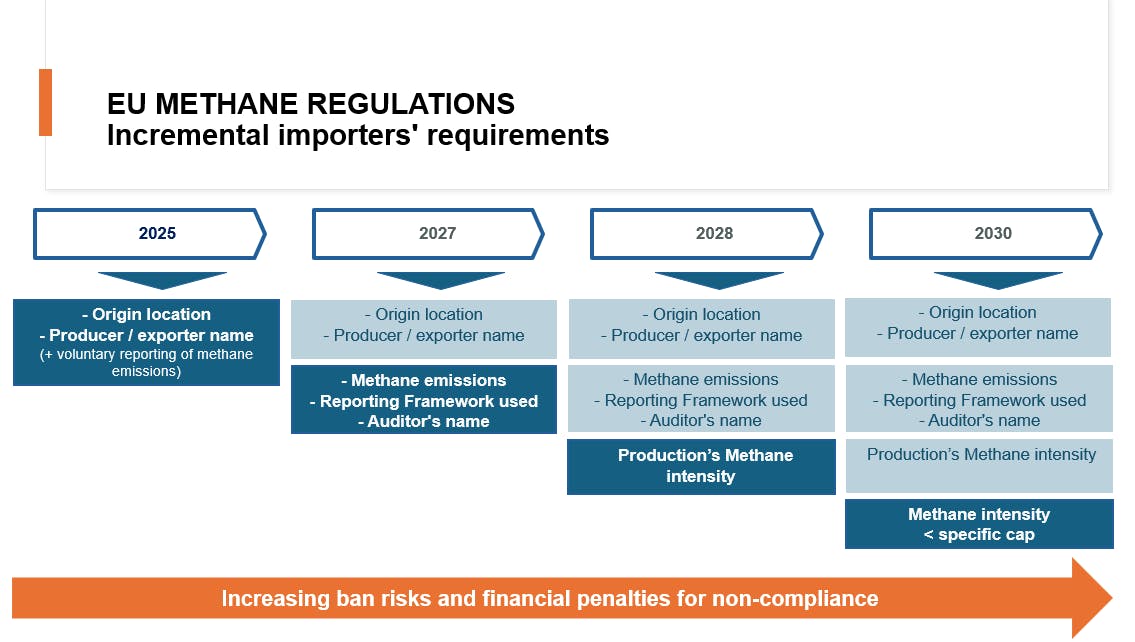2 minutes to understand the European Union's New Methane Regulation
On August 4th, 2024, the EU enacted a groundbreaking regulation aimed at reducing methane emissions across the oil, gas, and coal sectors, targeting both EU operators and for importers.

The European Union recently adopted a new regulation, entering into for on August 4th 2024, detailing a set of rules aimed at reducing methane emissions across oil, gas, and coal operations within the EU as well as imports of these resources from outside the bloc.
Why EU is targeting methane emissions ?
Methane, CH4, ranks as the second most abundant anthropogenic greenhouse gas after CO2. Despite existing in lower concentrations than CO2 in the atmosphere, methane has a significantly higher Global Warming Potential (GWP), making it a major contributor to global warming.
Methane (CH₄) is closely linked to the fossil energy industry, particularly in the extraction, processing, and transportation phases. The EU, as one of the world’s largest importers of fossil fuels, is leveraging this regulation to cut down methane emissions and set a global standard for environmental responsibility
The new regulation : an overview
The Regulation introduces set-by-step obligations for European operators and importers of natural gas, oil and coal to reduce leaks and venting, promote better monitoring, and enforce stricter controls.
Here's a summary of the main requirements for both EU operators and importers under this new regulation:
For European Operators
- Monitoring, Reporting, and Verification (MRV): Operators are requested to implement robust systems to monitor, report, and verify methane emissions. This includes regular inspections, accurate data collection and an annual reporting - by May 31st each year, starting from May 5th, 2025 - to submit detailed annual reports on methane emissions, ensuring transparency and accountability.
- Leak Detection and Repair (LDAR): Frequent inspections for methane leaks are mandatory with immediate repair obligations for any detected leaks. The use of state-of-the-art technology for detecting and repairing leaks is encouraged to reduce emissions effectively.
- Flaring and Venting: The regulation asks for strict limitations on flaring (burning off excess gas) and venting (releasing gas directly into the atmosphere), practices that are significant sources of methane emissions.
- Capture and Utilization: Economic operators must capture methane where possible and explore options for its utilization rather than resorting to flaring or venting.
For importers
- Starting in 2025: Importers must report annually on the source origin of gas, the names of producers, and if any, on methane emissions mitigation and monitoring measures in place. This applies to all contracts, whether signed before or after August 2024.
- By January 2027: Importers must demonstrate that the methane emissions from their supply chains meet MRV standards equivalent to those in the EU. For existing contracts, an "all reasonable efforts" clause requires importers to justify their efforts to meet these standards to national authorities.
For both EU operators and importers
- By August 5th, 2028, and annually thereafter: EU producers and importers must report the methane intensity* of production, including a "all reasonable efforts" clause for importers with contracts signed before August 4th, 2024.
- By August 5th, 2030, and annually thereafter: New contracts concluded or renewed after this date must demonstrate that methane intensity remains below a specific cap.
*By August 5th, 2027, the European Commission will set out the methodology for calculating the methane intensity of production for crude oil, natural gas, and coal placed on the EU market, considering all production processes and site conditions.

Other key steps:
- Third-Party Verification: Independent third-party verification of reported data is required to ensure accuracy and adherence to EU standards.
- National Supervision and penalties: Member States are expected to establish national bodies to supervise the implementation of these regulations and enforce penalties for non-compliance.
These new regulations place the EU at the forefront of global efforts to reduce methane emissions, setting a precedent for other regions to follow. For operators and importers, the emphasis on stringent monitoring, reporting, and adherence to high standards means that early preparation and investment in compliance technologies are crucial.


